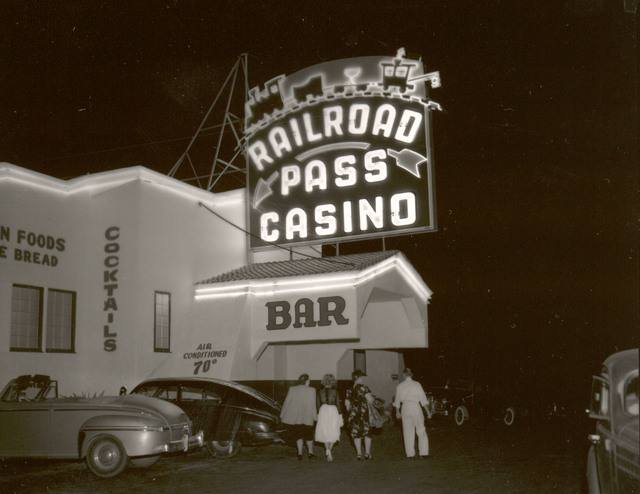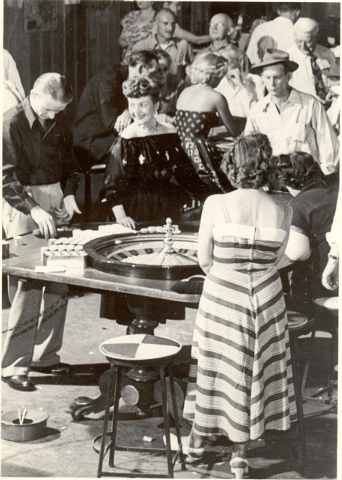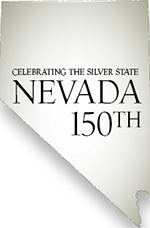Gambling’s roots run deep
Editor’s Note: Nevada 150 is a yearlong series highlighting the people, places and things that make up the history of the state.
Gambling was part of Nevada’s history long before statehood in 1864.
The activity was frowned upon by some and welcomed by others.
From the late 1800s through World War I, state lawmakers attempted to legalize forms of gambling. In 1909, however, the anti-gambling movement pushed through a bill, signed into law by Gov. Denver Dickerson, that made it illegal for a business to operate card games, offer slot machines or make book on horse races.
“But gamblers at least kept a foot in the door,” David G. Schwartz, director of UNLV’s Center for Gaming Research, wrote in “Roll the Bones,” his 2006 book on the history of gambling.
State lawmakers voted to relax some of the laws over the years while card rooms — legal and outlaw — flourished in Reno and Las Vegas.
In 1931, Gov. Fred Balzer signed into law Assembly Bill 98, which was introduced into the Legislature by Phil Tobin, a freshman assemblyman and rancher from Humbolt County. The bill authorized full-on casino gambling, including all forms of card games, roulette, craps and slot machines.
The measure almost went unnoticed. The action that brought the most attention that year was Balzer’s signature on a bill that created Nevada’s quickie divorce laws, the most liberal in the country.
Schwartz said gaming legalization in Nevada wasn’t done for the tax dollars on casino revenues, which is the primary reason given by states that have enacted laws over the past two decades to legalize casinos.
“Businesses, such as taverns, thought they would benefit because gambling would bring in more tourists,” Schwartz said in an interview. Legalized gambling “was something other states weren’t doing.”
Nevada set up a structure to try and regulate its now-growing casino industry, but the authority was placed in the hands of the Nevada Tax Commission.
Sen. Estes Kefauver, a Democrat from Tennessee, began a much-publicized investigation into organized crime in the United States during the 1950s. One of the areas of focus was Nevada’s casino market.
A televised Senate committee hearing chaired by Kefauver in 1950 explored organized crime’s control of gambling. Reputed gangsters who were subpoenaed to testify at the hearing invoked their Fifth Amendment rights when asked simple questions.
In 1958, Nevadans elected Grant Sawyer as governor. In his first legislative session in 1959, he pushed through changes to Nevada’s system of gaming control.
Schwartz said one of the underlying reasons Sawyer sought to change the regulatory structure was a fear the federal government would step in and regulate the industry, placing a high enough tax rate that it would be almost impossible for casinos to turn a profit.
In his 1993 oral history book, “Hang Tough: An Activist in the Governor’s Mansion,” Sawyer said he decided the Tax Commission should be exclusively dedicated to tax matters.
The law created a full-time investigative Gaming Control Board that would recommend approval or rejection of license applications to the part-time Nevada Gaming Commission, which would make the final ruling.
“In my first state-of-the-state message, I recommended my new regulation system,” Sawyer wrote. “Although there was some opposition, no partisan dispute developed, and the proposal was enacted into law.”
The basic structure of the system created by Sawyer is still in place today.
“Our approach to gaming regulation has worked out reasonably well, although there is a spirit of competition between the control board and the commission,” wrote the former governor, who served two terms between 1959 and 1966.
Sawyer, who died in 1996, went on to a long legal career, establishing the statewide law firm of Lionel Sawyer &Collins.
Sawyer understood the federal government’s interest in Nevada’s casinos. The new regulatory process served a purpose to try and weed out the elements of organized crime in Nevada casinos during the 1960s. He said the Kefauver hearings embarrassed Nevada.
“We took rather forceful measures to address our problem,” Sawyer wrote. “We were dealing with a different brand of gaming than we have today. Many in the industry were alleged to have come from unsavory backgrounds, from the mob as it were, and they were experts at applying leverage and exerting undue influence, if not with money, then by other means, such as catching you in a compromising position.”
Sawyer wrote that he surrounded himself with people “who could not be gotten to.”
Gaming attorney Bob Faiss, who was Sawyer’s assistant in the governor’s office and has been with Lionel Sawyer &Collins since the early 1970s, said Nevada’s legalized gaming industry was frowned upon by the federal government in the 1960s.
Years later, other states and countries use Nevada’s regulatory structure as a blueprint for their own.
“They don’t necessarily copy us,” Faiss said. “A little part of Nevada is in every new gaming control system.”
Nevada’s gaming industry has flourished. The state’s casino gaming revenue reached an all-time high of $12.8 billion in 2007. The recession has brought the figures down over the past few years, with revenues of $10.8 billion reported in 2012.
Meanwhile, gaming has expanded across the United States since the 1990s. Commercial casinos — riverboat, race track and land-based — were located in 23 states as of last year, producing $37.34 billion in gaming revenues according to the American Gaming Association.
Nowadays, thanks to luxury hotel rooms, conventions, retail, restaurants and other forms of entertainment, Nevada casinos, especially those on the Strip, are less reliant on gaming revenues.
According to the Nevada Gaming Control Board’s annual Gaming Abstract Report, nongaming spending by customers accounted for 64 percent of the Strip’s overall $15.3 billion of total revenues in fiscal 2012. With casino options growing throughout the United States, the gap will continue to widen.
“People don’t need to come here to play slots and shoot craps,” Schwartz said. “There is less demand.”
Las Vegas — and Nevada for that matter — will always be relevant to the gaming industry, he added. Gamblers and visitors alike want the experience, amenities and history that only the state’s casinos can offer.
“There are some nice suites (at the Grand Victoria Casino) in Elgin, Ill.,” Schwartz said. “But they don’t have the ‘Rain Man’ suite” at Caesars Palace.
Contact reporter Howard Stutz at hstutz@reviewjournal.com or 702-477-3871. Follow @howardstutz on Twitter.
















